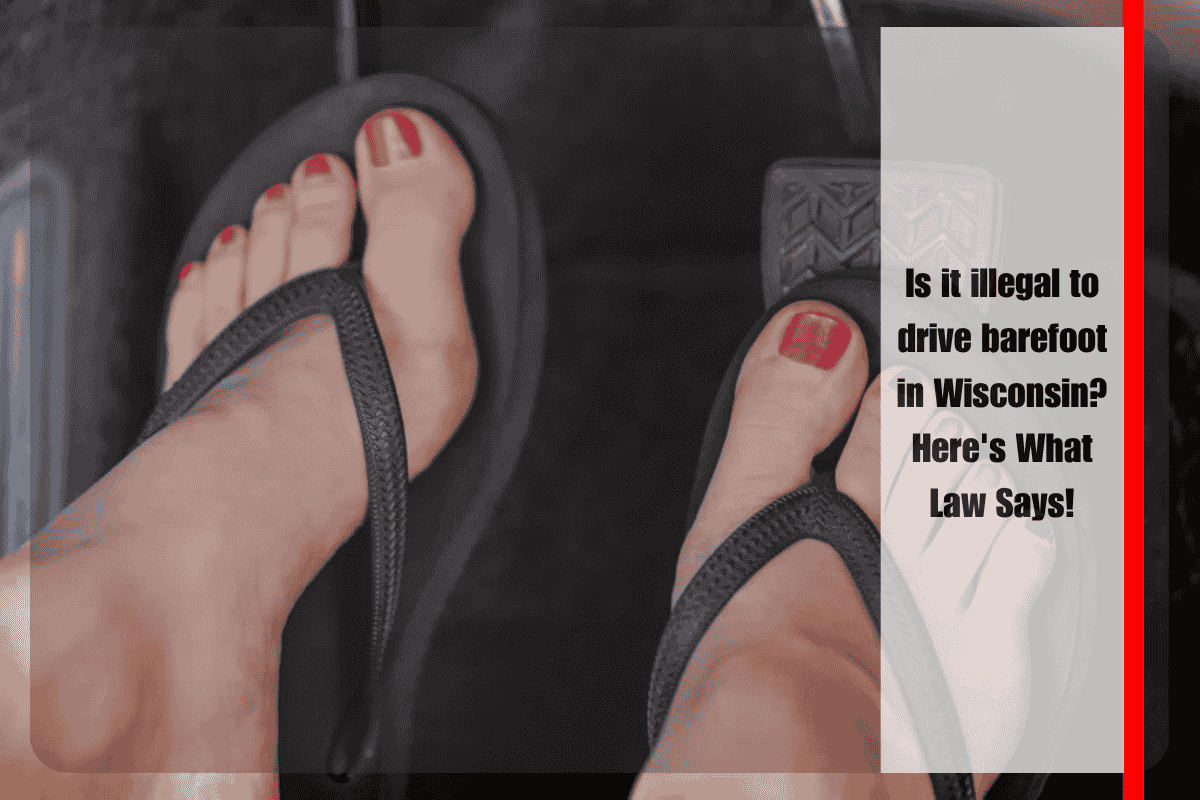Many drivers might wonder whether it’s legal to drive barefoot in Wisconsin. While it may seem like an odd question, there’s a common misconception that driving without shoes is against the law. In reality, driving barefoot isn’t explicitly illegal in most places, including Wisconsin. However, there are still important considerations regarding safety and the law when it comes to driving barefoot. This article will explore the legal landscape of driving barefoot in Wisconsin, discuss safety concerns, and explain how driving barefoot might impact your legal standing in the state.
Is It Illegal to Drive Barefoot in Wisconsin?
No, it is not illegal to drive barefoot in Wisconsin. The state does not have any laws that explicitly prohibit driving without shoes. In fact, there are no specific laws in Wisconsin, or most states, that directly address the act of driving barefoot. As long as the driver is in control of the vehicle and is following all traffic laws, driving barefoot is not a criminal offense.
That being said, just because it is not illegal doesn’t mean it’s always the best choice. Driving barefoot can present some safety concerns, which are worth considering before deciding whether to drive without shoes.
Safety Concerns of Driving Barefoot
While driving barefoot is not illegal, safety is a key issue that could have legal consequences if something goes wrong. The most common safety concern is lack of traction. When driving barefoot, your feet may not have the same grip on the pedals as they would when wearing shoes. This could make it harder to control the gas pedal, brake, or clutch in some vehicles, especially in emergency situations.
For example, if you need to make a sudden stop or press the pedal quickly, your barefoot might slip or not apply the right amount of pressure, which could lead to an accident. In such cases, you could be considered negligent or at fault if the lack of control contributes to a crash or violation of traffic laws.
Furthermore, foot fatigue can also be a concern when driving barefoot for long periods. Shoes provide comfort and support, helping to prevent tiredness that might affect your ability to drive safely. Without shoes, your feet could become sore or uncomfortable, potentially distracting you from the task at hand.
When Could Driving Barefoot Lead to Legal Trouble?
While driving barefoot itself is not illegal in Wisconsin, there are situations where it could lead to legal trouble if it is deemed unsafe or if it contributes to an accident. Here’s how driving barefoot might lead to issues:
Reckless Driving: If driving barefoot causes you to lose control of your vehicle, such as when your foot slips off the pedals or you can’t apply enough pressure to stop quickly, and this leads to an accident, you could be charged with reckless driving or negligence. Reckless driving is a serious offense in Wisconsin and could lead to fines, license points, or even suspension, depending on the circumstances.
Insurance Claims: If you’re involved in an accident while driving barefoot and it’s determined that the lack of proper footwear contributed to the accident, your insurance might have a valid reason to reduce or deny coverage. Insurance companies often take into account whether a driver was behaving negligently or not adhering to safe driving practices when determining fault or liability.
Traffic Citations: If a police officer believes that your driving behavior is unsafe or that you are not in full control of the vehicle (because of driving barefoot), you could be issued a citation for unsafe driving, even though there’s no law specifically prohibiting barefoot driving. This is rare but still a possibility if an officer observes that driving barefoot is compromising your ability to control the vehicle.
What Are the Best Practices When Driving?
Even though it’s not illegal to drive barefoot in Wisconsin, there are better practices to ensure your safety while on the road. Here are a few tips for safer driving:
Wear Comfortable Footwear: While it’s not required by law, wearing comfortable shoes that provide proper grip and support for your feet is the safest choice. This will ensure you have better control over the vehicle’s pedals, especially in emergency situations.
Avoid Driving Barefoot in Certain Situations: If you find yourself driving barefoot on long trips or in heavy traffic, consider switching to shoes. This will reduce the risk of discomfort, foot fatigue, and slipping while driving.
Stay Alert: Regardless of whether you are wearing shoes or not, always make sure you are alert and focused while driving. If you’re feeling fatigued or uncomfortable while driving barefoot, it’s a good idea to pull over and take a break.
Check Your Pedals: If you do decide to drive barefoot, make sure your pedals are free of dirt, mud, or anything that could reduce traction. Keeping the pedal area clean will help ensure better control, even without shoes.
Driving barefoot is not illegal in Wisconsin, but it can lead to safety issues and potentially legal consequences if it causes you to lose control of your vehicle. While the state does not have specific laws against barefoot driving, it’s important to consider the safety risks associated with it. For the best driving experience and to avoid possible accidents or legal trouble, it’s recommended to wear shoes while driving. Always prioritize safety, and be mindful of your control over the vehicle to avoid accidents or violations that could result in fines or insurance complications.
Sources
[1] https://1800lionlaw.com/is-it-illegal-to-drive-barefoot/
[2] https://www.palmenfiat.com/blogs/5715/is-it-legal-to-drive-in-wisconsin-without-shoes
[3] https://y105music.com/driving-barefoot-in-iowa-illinois-wisconsin/
[4] https://wisconsindot.gov/Pages/safety/enforcement/faqs/default.aspx
[5] https://cdn.preterhuman.net/texts/law/driving.bar












